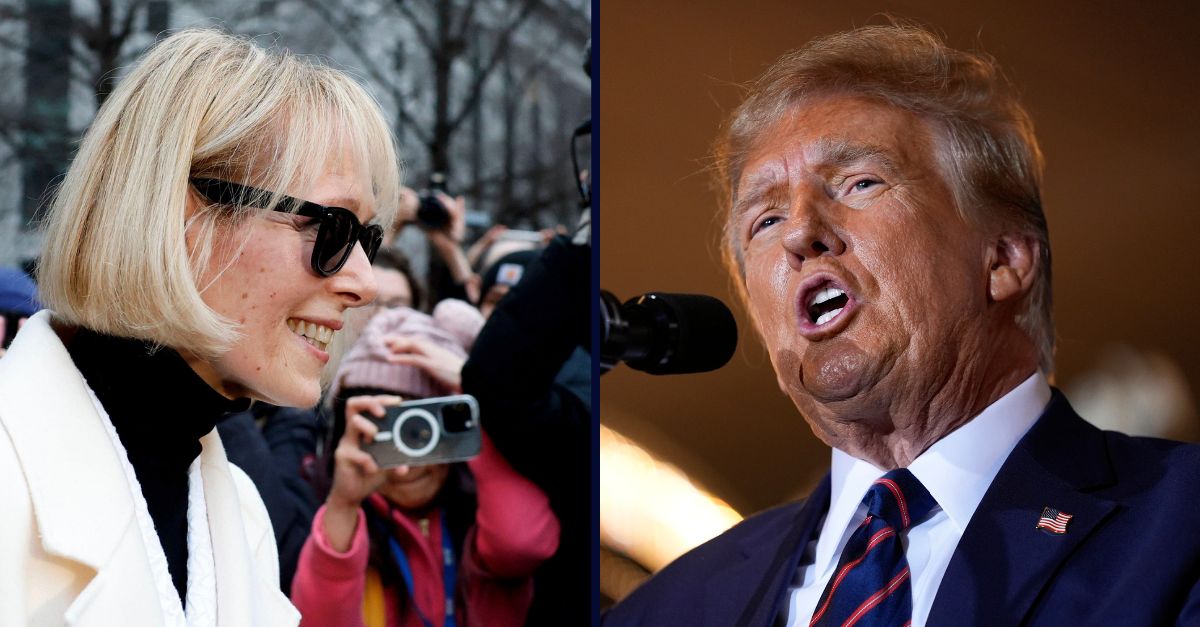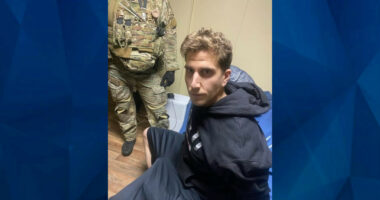
Left: Journalist E. Jean Carroll departs from the courthouse after the conclusion of the damages trial against Donald Trump at Manhattan Federal Court on Friday, January 26, 2024 in New York City (John Angelillo, Alamy Live News via AP). Right: Republican former President Donald Trump speaks at a primary election night party in Nashua, N.H., Jan. 23, 2024. (AP Photo/Matt Rourke).
President-elect Donald Trump on Tuesday asked a federal court of appeals to reconsider taking on his request for a new trial in the defamation case brought — and won — by writer E. Jean Carroll.
In December 2024, a three-judge panel on the U.S. Court of Appeals for the Second Circuit turned down a substantially similar request. The panel determined the district court had not made any error or “combination of” errors that “affected” Trump’s “substantial rights.”
Now, Trump is asking for the full court to consider the civil case — and, necessarily, to reconsider the argument about errors anew.
In May 2023, a jury of Manhattanites found that Trump sexually abused Carroll in the dressing room of New York City department store Bergdorf Goodman sometime in the late 1990s — and later defamed her when he strongly denied the allegations and also denied ever knowing Carroll, to the press. While the civil sexual assault finding has zero force of criminal guilt, it was essentially cited as a necessary precursor to the defamation lawsuit. In that first case, the jury ordered Trump to pay his victim $5 million in damages.
In January, another Manhattan jury ruled in Carroll’s favor over a markedly similar set of legal complaints. Jurors would eventually award Carroll $83.3 million in that case.
Trump is asking for new trials in both cases.
The latest defense motion denies the claims advanced by the plaintiff — and accuses Carroll of literally fictionalizing her allegations.
“President Trump has clearly and consistently denied that the supposed incident ever occurred,” the filing reads. “No physical or DNA evidence corroborates Carroll’s allegations. There were no eyewitnesses, no video evidence, and no police report or investigation. Carroll never reported the supposed incident nor sought video footage from Bergdorf Goodman, despite claiming that such footage exists. No reference to the supposed incident exists in decades of subsequent communications with her ‘outcry’ witnesses. Carroll waited over 20 years to falsely accuse President Trump, did so at a time calculated to injure him politically and profit herself, and told a story that precisely matches a plotline from one of her favorite TV shows.”
While denying the claims in categorical terms, the defense motion’s legal argument is that the district court allowed Carroll to overcome the above-claimed evidentiary deficits through the use of extraneous testimony. This testimony, a form of character evidence, was used by the plaintiff for the proposition that it tended to show Trump would have a propensity to commit such acts against Carroll and others.
Specifically, the disputed evidence that Trump claims was admitted in error was testimony from two women and one audio recording.
Those two women, Jessica Leeds and Natasha Stoynoff, testified Trump sexually assaulted them. Leeds described in a deposition Trump’s alleged sexual assault of her in the first-class cabin of an airplane in the 1970s. Stoynoff alleged Trump had assaulted her in 2005 when she was at Mar-a-Lago to interview him and his wife.
U.S. District Judge Lewis A. Kaplan also allowed jurors to consider the infamous Access Hollywood recording and “grab ’em” remarks between the defendant and Billy Bush — which Trump apologized for but downplayed as “locker room talk” before the 2016 election.
“To have any chance of persuading a jury, Carroll’s implausible, unsubstantiated allegations had to be — and repeatedly were — propped up by the erroneous admission of highly inflammatory propensity evidence,” the Tuesday motion argues. “These errors illustrate the devastating consequences of misinterpreting the Federal Rules of Evidence and erroneously permitting a ‘pile-on’ of inflammatory, inadmissible propensity evidence.”
In the three-judge decision from last year, the Second Circuit disagreed, finding that “the jury could reasonably infer from Ms. Stoynoff’s testimony and the Access Hollywood tape that Mr. Trump engaged in similar conduct with other women — a pattern of abrupt, nonconsensual, and physical advances on women he barely knew.”
“We conclude that the Access Hollywood tape described conduct that was sufficiently similar in material respects to the conduct alleged by Ms. Carroll (and Ms. Leeds and Ms. Stoynoff) to show the existence of a pattern tending to prove the actus reus, and not mere propensity,” the panel ruled. “The acts are sufficiently similar to show a pattern or ‘recurring modus operandi.’ Moreover, the tape was ‘directly corroborative’ of the testimony of Ms. Carroll, Ms. Leeds, and Ms. Stoynoff as to the pattern of behavior each allegedly experienced, and ‘the matter corroborated’ was one of the most ‘significant’ in the case — whether the assault of Ms. Carroll actually occurred.”
Trump, for his part, says the appeals court actually got the law wrong — and the motion applies a slippery-slope argument.
“These legal errors — if left uncorrected — will lead to the improper, highly damaging admission of inflammatory propensity evidence in a wide range of future cases,” the defense motion reads.
For each of the women, Trump argues, the appellate court ignored the clear terms of the federal rules of civil procedure to allow their testimony into the Carroll case. Testimony regarding an alleged “sexual assault” is often strictly controlled under the rules.
In Leeds’ case, Trump argues, the previous judges backfilled her allegations into a “simple assault” allegation because the federal “sexual assault” statute did not exist until “approximately 15 years after the alleged event occurred.”
In Stoynoff’s case, Trump argues, the language of the rule was given short shrift because this witness described an attempted sexual assault that did not occur in the jurisdiction covered by the specific rule relied on in the proceedings.
As for the Access Hollywood tape, Trump argues the appellate panel flatly misunderstood the relevant law about when and how an alleged “modus operandi” can be used.
“The panel decision conflicts with decisions of the Supreme Court, this Court, and other federal Circuits on questions of exceptional importance,” the defense motion goes on.
The motion concludes by arguing that such “errors” will influence numerous cases down the line, “resulting in unjust verdicts based on passion and prejudice instead of the law and evidence.”








